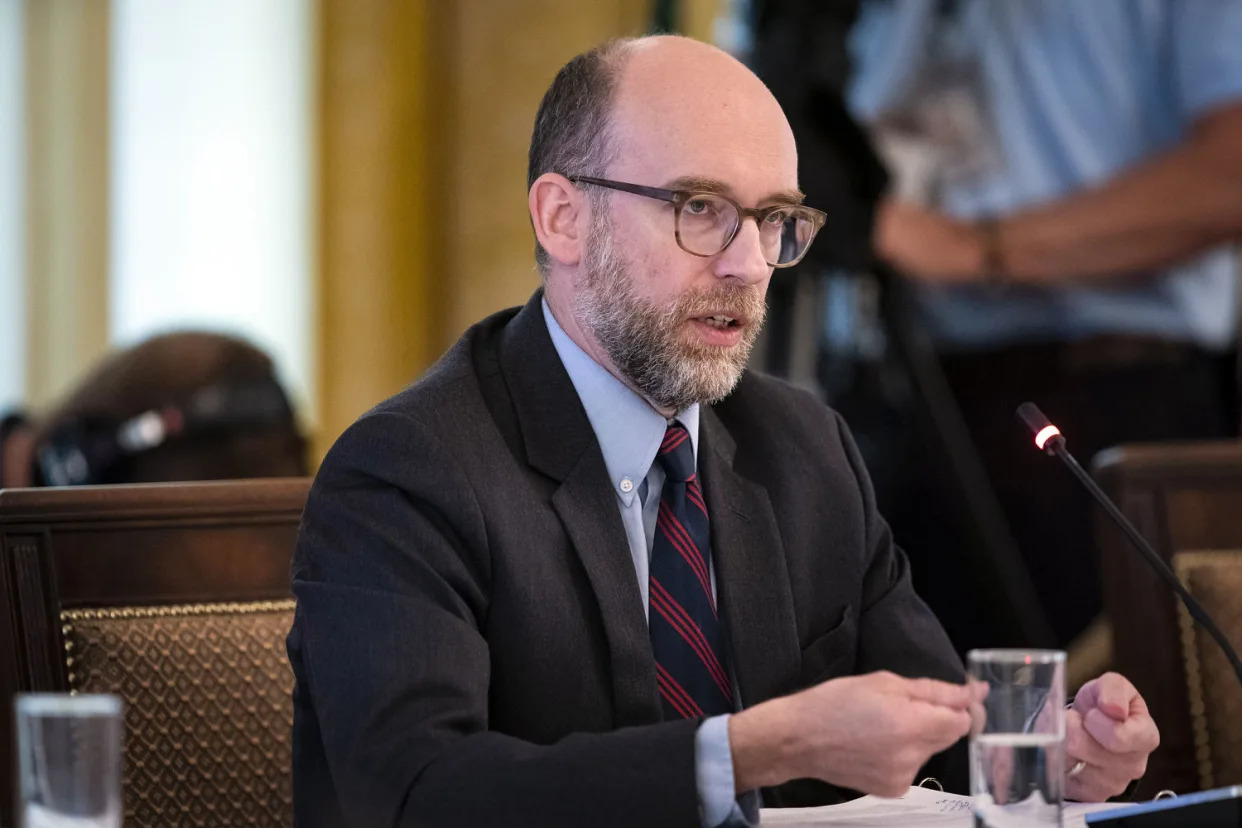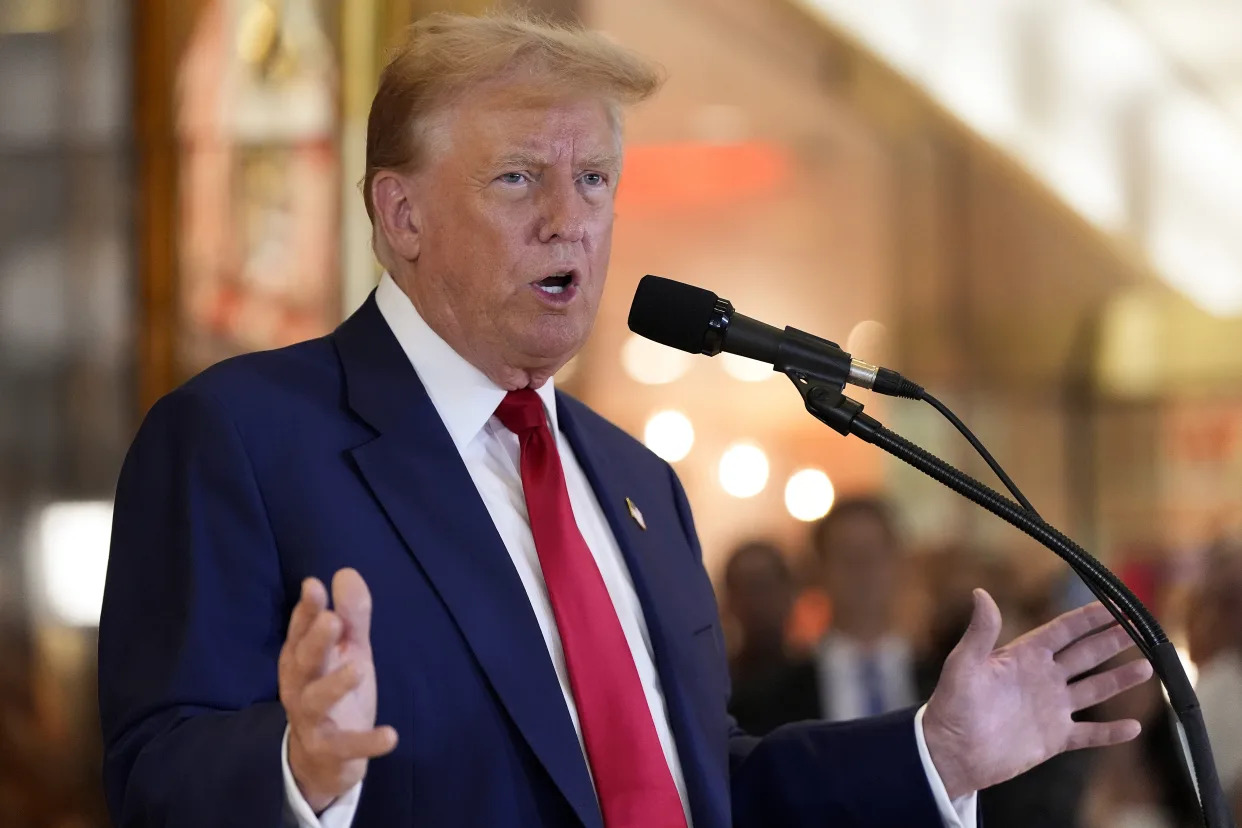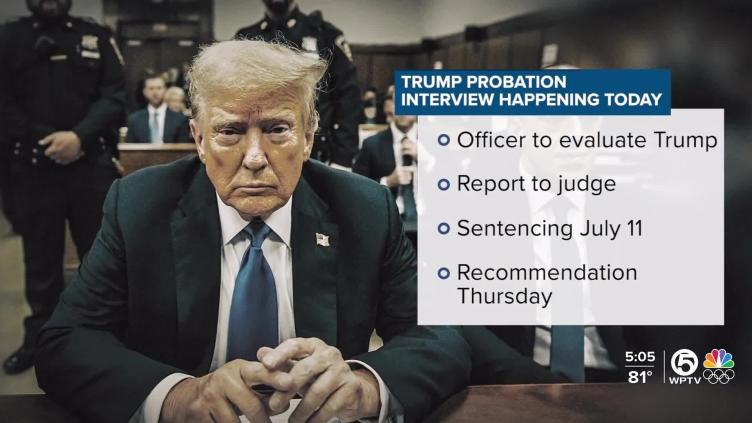Donald Trump's Christian-nationalist radical has big plans for America
Heather Digby Parton
Mon, June 10, 2024

Russ Vought Samuel Corum/Getty Images
Over the weekend, the Washington Post's Beth Reinhard published an excellent article about one of Donald Trump's most visionary advisers, an obscure figure named Russ Vought. He was a boring Republican bureaucrat who served as director of the Office of Management and Budget from July 2020 until Trump left office. He previously served as deputy director and acting director at OMB and prior to his stint in the White House worked at Heritage Action, the activist arm of the Heritage Foundation, where he was budget director for the Republican Study Group in Congress. In other words, for years Vought was a numbers cruncher providing far-right Republicans with their specious arguments about the government going broke and the need to drastically cut the safety net.
Who knew that such a person also had big ideas about how to destroy the U.S. government from the inside?
Vought is a self-described Christian nationalist who is spearheading plans for a rapid expansion of executive power under a theory he calls “radical constitutionalism" (an oxymoron, but it sure sounds snappy.) He has been working for a right-wing network called the Center for Renewing America, which is full of Trump acolytes, many of whom would likely become high-ranking officials in a future Trump administration. That includes Vought, often discussed as a potential White House chief of staff.
Reinhard writes:
“We are living in a post-Constitutional time,” Vought wrote in a seminal 2022 essay, which argued that the left has corrupted the nation’s laws and institutions. Last week, after a jury convicted Trump of falsifying business records, Vought tweeted: “Do not tell me that we are living under the Constitution.”
Vought aims to harness what he calls the “woke and weaponized” bureaucracy that stymied the former president by stocking federal agencies with hardcore disciples who would wage culture wars on abortion and immigration. The proposals championed by Vought and other Trump allies to fundamentally reset the balance of power would represent a historic shift — one they see as a needed corrective.
Vought has been named by the Republican National Committee as the policy director for the 2024 platform committee. He wrote the chapter on the executive office of the president for Project 2025. And he is said to be in charge of planning for the first 180 days of a new Trump administration.
Vought is an evangelical Christian who has adopted the Trump credo that the ends justify the means. While in the White House, he saw people who balked at illegal and unethical activity as squishes and whenever he could do so, his office helped Trump do end-runs around the law and regulations, from reappropriating funds for his border wall to helping him pressure Volodymyr Zelenskyy to slander Joe Biden, the scandal that got Trump impeached the first time around. Vought also came up with the notorious Schedule F, a plan to eliminate many civil service posts and replace long-serving government employees with Trump lackeys. They ran out of time to fully implement that strategy in Trump's first term, but you can bet they'll get it done ASAP if he wins in November.
Trump's only agenda is to prove he's not a loser, keep himself out of jail and wreak revenge on his enemies. Whatever else his underlings and enablers have planned for his second term is fine with him. Well, Vought has plans, and they're big ones. His "radical constitutionalism" is an extreme reinterpretation of what the American system and the rule of law stand for.
As Reinhard reports, Vought seeks to redefine immigration as an "invasion," which would allow the president to invoke wartime powers. He's on the same page as Trump with respect to mass deportation because he doesn't believe that most immigrants can understand America's supposed Judeo-Christian worldview. He calls this "rethinking the legal paradigms that have confined our ability to return to the original Constitution."
Vought is one of the primary influences in right-wing circles pushing to eliminate any independence of agencies in the executive branch, starting of course with the Justice Department. On a recent podcast, he backed Trump's call to prosecute Trump's enemies saying, "It can’t just be hearings, it has to be investigations, an army of investigators that lead to firm convictions.” He supports invoking the Insurrection Act, banning medical abortions and implementing policies to boost the birth rate. (Yes, he's one of those guys too.) In other words, he is an authoritarian nightmare.
Whenever I read about extremists like Vought and others who are plotting to overturn the Constitution, like so many others, I can't help but think about 1930s Germany. The parallels aren't perfect but they are way too close for comfort. The Nazi Big Lie was about the supposed "stab in the back" — the notion that the Germans hadn't actually lost World War I but were instead betrayed by Jews, Marxists, democrats and internationalists. Trump's Big Lie is that he didn't lose the 2020 election (typically, it's all about him) but it's had a similar motivating effect on his followers.
In both cases, there is a fairly pathetic attempt to overthrow the government and the political establishment subsequently fails to take the legal steps available to prevent them from making a comeback. This facilitates the growth of an authoritarian movement, infused with racism and grievance. Although this movement never achieves a majority in the country over time its leaders learn that there are better ways of achieving its goals by exploiting weaknesses in the system that had previously gone undiscovered.
This form of revolution doesn't rely on violent overthrow but it does require intimidation and threats of violence against political enemies. It cannot succeed without the enabling and cooperation of establishment politicians and officials who either believe they can control the extremists in their midst or simply sign on for their own ambition uncaring of the consequences. Vought is in the latter category, an opportunist who sees Donald Trump as the ticket to a Christian-nationalist America. Whether Vought is a MAGA true believer is immaterial. He's an efficient bureaucrat, trained in the right-wing fever swamps, who knows how to get things done. And what he wants to do is horrifying.
Opinion | Russ Vought is the most dangerous MAGA diehard you've never heard of
Hayes Brown
Tue, June 11, 2024

At the beginning of former President Donald Trump’s term, chaos oozed from of every corner of the West Wing, well beyond the norm for presidential transitions. Inexperienced sycophants and would-be petty tyrants clashed daily with the supposed “adults in the room” in a battle for the new president’s limited attention span. Russ Vought is working to ensure that should Trump win a second term, things will be different.
As a former head of the Office of Management and Budget, Vought isn’t a household name like former White House adviser Steve Bannon or even as known among the political set as Trump’s immigration ghoul, Stephen Miller. But as a recent profile of him in The Washington Post suggests, he’s set to be a major player if Trump returns to the White House. Even more concerning, Vought displays a combination of MAGA zealotry and familiarity with Washington’s workings that makes him a uniquely dangerous figure for the future of the country.
Longtime readers of this column might remember previous coverage of Vought in his current role leading the Center for Renewing America, a think tank that has been advising congressional Republicans and acting as a jobs program for former Trump administration B-listers. It was Vought who encouraged congressional Republicans to hold the debt ceiling hostage, a failed strategy that ended with the ouster of House Speaker Kevin McCarthy, R-Calif. His organization also pushed the GOP to focus on cutting funding to the “woke and weaponized government.” Vought himself personally circulated an alternative budget on Capitol Hill that included “$2 trillion in cuts to Medicaid, the health program for the poor; more than $600 billion in cuts to the Affordable Care Act; more than $400 billion in cuts to food stamps; hundreds of billions of dollars in cuts to educational subsidies; and a halving of the State Department and the Labor Department, among other federal agencies,” as the Post documented last year.
It’s a testament to Vought’s growing policy influence that the Heritage Foundation tapped him to write the chapter on the Executive Office of the President in “Project 2025,” a massive blueprint for the next GOP president to follow. He is also putting together the initiative’s “playbook for the first 180 days” of a second Trump term, the Post reported. Though the Trump campaign has tried to distance itself from Project 2025, there’s little chance that an incoming administration wouldn’t draw heavily on the work being done.
It may be even more concerning that Vought has been tapped to be policy director for the GOP’s 2024 platform committee. He’ll be joined by a deputy who, like him, was a fierce advocate of the false claims that Joe Biden stole the election from Trump. Unlike in 2020, when the Republican National Committee forwent drafting a platform, the plank Vought will develop will be the policies that Republicans up and down the ballot will be campaigning on ahead of Election Day.
Vought is particularly vocal about empowering OMB’s director to enforce the president’s will throughout the executive branch — an unsurprising interest given how much damage he did from that perch in the Trump administration. In 2019, he helped craft a doomed effort to kill Obamacare. The following year he signed off on redirecting funds from the Defense Department to construct Trump’s border wall in 2020. He also was responsible for withholding crucial military aid to Ukraine as part of the scheme that led to Trump’s first impeachment. The Government Accountability Office found the latter move to be a violation of the law against “impoundment” that Congress passed in 1974.
Vought has argued that the anti-impoundment law and other post-Watergate restraints on the presidency need to be overturned. Accordingly, he’s one of the loudest voices for transforming the Justice Department from an independent agency into a tool for Trump’s vendettas. If anything, the radical shifts he has proposed for a second Trump term would make the executive branch both more powerful than at any time since the Nixon administration and more openly partisan, with authority stripped from career officials and consolidated in political appointees’ hands.
It’s not surprising that, given how extreme Vought’s proposals are, they’ve found little success with Biden sitting in the White House and Democrats controlling the Senate. But the ideas that he and his team are cranking out are set to shape the future of the Republican Party in the same way the Heritage Foundation shaped the Reagan administration and helped develop three decades of GOP orthodoxy. Given his unabashed defense of Christian nationalism, those ideas are set to be massively harmful to LGBTQ Americans and immigrants should he be given a chance to enact them.
He may well get that chance, given that the Post names Vought as a potential White House chief of staff if Trump reclaims the Oval Office. If this comes to pass, he’d be from a different mold than any of the chiefs of staff in the first Trump administration. Because while Vought is as committed to enabling Trump as even the most subservient lackeys who held the position, he’s no stranger to the gears that keep Washington’s policy machinery turning. This is a person who has spent the last 30 years working his way up from a congressional aide to becoming a conservative lobbyist to landing in the Eisenhower Executive Office Building.
Given the extent of the plans he has made, Vought would have a frightening level of understanding of how to execute his vision from the top down with the full weight of the presidency behind him as an unofficial prime minister. And, most worrying, it would most likely be a road map to authoritarianism for future candidates to follow even long after Trump’s name is no longer on the ballot.
This article was originally published on MSNBC.com
The 'Chilling' Trump Plan That Could Pave The Way For Authoritarianism
Matt Shuham
Tue, June 11, 2024
Donald Trump has no greater enemy than the United States’ federal bureaucracy — what he calls the “deep state.” And he has a plan to bend it to his will if he’s elected in November.
The plan, to create something called “Schedule F,” would make tens of thousands of civil servants easier to fire, fundamentally changing the nature of the federal government — and, some worry, paving the way for authoritarianism.
Schedule F is a new category, or schedule, of federal workers who are exempt from codified job protections, like being hired and fired based on merit and having the ability to appeal disciplinary action.
The majority of federal civil service employees, from climate scientists to bank examiners to IT specialists, are covered by these protections; some positions, like postal workers and intelligence officers, are currently exempt. That system ensures that experience and skill, rather than political favoritism or personal connections, guide hiring and firing decisions within the federal government.
But conservatives have long complained that the president should exercise more control over the federal bureaucracy, and Trump in particular has said it needs to be “brought to heel.”
Trump created Schedule F in an October 2020 executive order. Under that order, federal workers involved in “confidential, policy-determining, policy-making and policy-advocating positions” — a vague description that would include at least tens of thousands of people — would be stripped of their civil service protections and reclassified as “at-will” appointees, meaning they could be hired or fired for any reason, or none at all.
Because the order came so late in Trump’s presidency, only a handful of agencies created lists of specific jobs that would be eligible for conversion to Schedule F. And President Joe Biden reversed the order before any jobs could actually be converted.
But Trump has explicitly said he’ll pursue Schedule F again if he’s elected. In a campaign video last year, Trump referred to Schedule F as an effort to “remove rogue bureaucrats.”
“I will wield that power very aggressively,” he said.
Federal employees, political scientists, union leaders and watchdog groups told HuffPost that Schedule F could lead to a “chilling” effect. At-will employment, they said, would make it harder for government workers to raise concerns that go against their bosses’ political loyalties. That could lead to a degradation of public services like disaster relief, financial regulation and the administration of government benefits.
“You can see where it can grind work to a halt, because even people who are trying to do the right thing [would] be afraid that if they do something wrong, they’ll be out of a job,” said Joe Spielberger, a policy counsel at the Project on Government Oversight who has raised alarms over how the implementation of Schedule F would harm key welfare programs like Social Security, Medicare and Medicaid.
Schedule F would be the “fundamental element of an authoritarian agenda,” he said, allowing Trump to take control of the vast federal bureaucracy and reverse generations of reforms.
Donald Moynihan, a professor of public policy at Georgetown University, signed on to an open letter in April arguing Schedule F would open the door to “politicization and patronage throughout the federal workforce.” Hetold HuffPost, “This feels like the biggest problem that the fewest people understand about a potential second Trump administration.”
“In the hands of a president who is not committed to democratic norms, taking control of the bureaucracy is a tried and tested way to work toward authoritarian government.”
In the hands of a president who is not committed to democratic norms, taking control of the bureaucracy is a tried and tested way to work toward authoritarian government.Donald Moynihan, professor of public policy, Georgetown University
The ‘Lightbulb Moment’
The push for Schedule F started with what one Trump staffer called a “lightbulb moment.” In 2019, James Sherk, a top White House adviser on civil service and labor policy, was frustrated by reports of federal workers pushing back against the Trump policy agenda. He started reading through existing U.S. law on federal labor rights, and realized that the language about exceptions from civil service protections could actually be interpreted quite broadly.
Such a change in interpretation would be a break from decades of precedent. Presidents only bring around 4,000 political appointees with them at the start of a new term, and many additionallyrequire Senate confirmation. These appointees are generally classified as “excepted” — theyaren’t required to complete standardized competitive civil service exams, butthey also aren’t afforded standard civil service protections. (The “excepted” portion of the federal workforce includes more than a million federal workers under various schedules, though the vast majority of them come from the United States Postal Service, the military, and Department of Veterans affairs.)
But Sherk argued that the “excepted” service should grow much larger, to include “the most important” federal workers — “the people who are telling all the rest of the bureaucracy what to do,” he said in a 2022 interview. In his view, the change would make the federal government more accountable to the White House, and therefore, the American people.
“Nothing in [federal law]says that you can only take away the civil service protections of political appointees,” Sherk said.
Sherk estimated that Schedule F would have applied to 1% to 3% of the federal workforce, or about 50,000 workers, had Biden not unwound it. But the number actually affected if Trump pursues Schedule F again could be much larger. A Government Accountability Office review of the few agencies that did start making Schedule F conversion lists found that agencies thought anywhere from 2% to 68% of their employees were eligible to be “rescheduled.”
The agency that found over two-thirds of its workers could be reclassified was the very policy-focused Office of Management and Budget. The Office of Personnel Management — the executive branch’s human resource’s office, and the office that would be responsible for actually overseeing the reclassification of workers under Schedule F — had approved the reclassification of OMB jobs ranging from IT specialists and office managers to attorneys, policy analysts and economists, according to government records obtained by the National Treasury Employees Union and the watchdog group American Oversight.
But the documents provide just a glimpse at the changes Schedule F could bring.
“We don’t know yet what we don’t know, which is why we’re going to court,” said Ron Fein, chief counsel for American Oversight, which has sued the Biden administration to release more records related to Schedule F. The group shared records it obtained with HuffPost, and NTEU has released similar documents publicly.
Last year,Republicans in both the House and Senate introduced legislation to make every executive branch employee “at-will.” And multiple former Republican presidential candidates expressed support for Schedule F, including Florida Gov. Ron DeSantis, who as a presidential candidate said of the so-called deep state, “We’re going to start slitting throats on day one.”
Project 2025, the 900-page right-wing agenda-in-waiting for Trump cooked up by the Heritage Foundation and dozens of other arch-conservative organizations, refers to plans to reintroduce Schedule F in several sections. And one member of the project’s three-person leadership team is Paul Dans, the former chief of staff at the OPM during the Trump administration.
The Project 2025 team has signaled that potential staffers in a second Trump White House would need to be on board: A questionnaire for potential new hires in a Trump administration asks applicants if they agree that “the President should be able to advance his/her agenda through the bureaucracy without hinderance from unelected federal officials.”
Neither Sherk nor representatives for Project 2025 responded to HuffPost’s requests for comment. And Trump’s campaign said in an all-purpose statement to HuffPost, “unless a message is coming directly from President Trump or an authorized member of his campaign team, no aspect of future presidential staffing or policy announcements should be deemed official.”
Wearing The Wrong Hat
For civil servants, the prospect of being “rescheduled” to Schedule F raises concerns about political pressure and interference — and frustration at yet another distraction keeping them from their work.
“The only person I’m loyal to is the American public, the American depositor, and the safety of our system,” said Vivian Hwa, a senior economist at the Federal Deposit Insurance Corporation, where she helps ensure banks’ complex financial models comply with the law. Hwa is also the union president for Washington, D.C.-based FDIC employees.
“We shouldn’t have to worry about other things, like, ‘I might be fired if I say the wrong thing to the wrong person,’ or, ‘I now have to compete with that guy for my job because that guy happens to wear a red hat or a blue hat,’” Hwa said.
Hwa doesn’t “touch” policy, she told HuffPost, but her team does “a lot of analytical work that could inform policy.”
Hwa said being rescheduled could make her colleagues feel pressure to politicize their work, or else fear being replaced by someone more politicallyaligned with higher-ups. Had Schedule F been in place in 2007, she said, she may have reconsidered her decision to enter the civil service.
“If I had known that signing up for a government job meant that you have to lean left or lean right depending on who’s in the office, I think that would change the calculus a little bit, knowing that you don’t have that job security,” she said.
The only person I’m loyal to is the American public, the American depositor, and the safety of our system.Vivian Hwa, union leader and FDIC senior economist
As a risk analyst at the Commodities Futures Trading Commission, Malcolm Alexander-Neal assesses clearinghouses to make sure they comply with financial regulations. Like Hwa, his job isn’t political, but he sees that it could be considered related to policy-making — and that the prospect of being stripped of civil service protections felt “dangerous” and “counterproductive.”
“Taxpayers should understand, that would be disruptive to the work I do,” he said.
Alexander-Neal, who is president of the union for CFTC employees, stressed that there already are safeguards in place to make sure federal workers keep taxpayers’ best interests in mind and report up the chain of command to political appointees. Injecting politics at the level of financial examiners could lead to a “huge increase in turnover” and a loss of institutional knowledge, he said, as well as deal a severe blow to morale and recruitment.
“There would be a huge perception of more politicization, and an erosion of public trust,” Alexander-Neal said. If Schedule F had been around at the start of his government career, he added, “I wouldn’t have been as interested.”
The Civil Service Atom Bomb
Sherk has answered criticisms about Schedule F politicizing the civil service by saying political discrimination is forbidden under the executive order.
“Schedule F expressly forbids hiring or firing based on political loyalty,” he told The New York Times last year.
The Trump-era executive order noted that existing law forbidding disciplinary action on the basis of various factors, like race or “political affiliation,” would still be applicable under Schedule F.
Moynihan, the public policy professor, is skeptical. He compared Sherk to Robert Oppenheimer, and Schedule F to a civil service atom bomb.
“Sherk is not going to determine how the tool will be used,” Moynihan said. “And the people in Trump world who will actually be in charge, the chief of staff and Cabinet-type positions, now have that tool, and they’re going to use it for their purposes.”
As Dans, likely a key player in the implementation of any Trump agenda, told Spectrum News last month: “There is a league of folks within the government that is highly partisan and really working against democracy, and they need to be excised from the government properly.”
Trump has repeatedly voiced even more politically charged rhetoric. He recently reposted a speech excerpt in which he promised to “demolish the deep state,” “drive out the globalists,” and “liberate America from these villains once and for all.”
As Steven Wasserman, a veteran federal prosecutor, told HuffPost, rhetoric about the “deep state” raises concerns that Trump could attempt to undermine the civil service protections that prevent the government from being used for “political revenge.”
Wasserman spoke to HuffPost in his capacity as president of the National Association of Assistant United States Attorneys, a role in which he represents about 1,000 dues-paying federal prosecutors on issues they care about — which have recently come to include civil service protections. He said he worries that Schedule F could be used to exert political pressure on civil servants’ decision-making, including at the Justice Department.
“That’s the concern, when taken to its logical extreme — that the government is used to favor certain people and disfavor other people,” he told HuffPost last week.
“That’s kind of classic authoritarianism, and not something you see in a representative democracy,” Wasserman added. “There’s a number of steps that need to occur before you slide in that direction — but once you strip away those protections, and you allow political pressure and influence to permeate and impact decision-making, it becomes a slippery slope.”
The first Trump administration had a record of targeting the civil service over its perceived politics.
In 2019, the Department of Agriculture announced that two of its research and grant-writing offices — the Economic Research Service and the National Institute of Food and Agriculture — would be moved from Washington, D.C., to Kansas City. Hundreds of researchers, economists and other experts were given just days to decide whether they wanted to pick up their families’ lives and cross the country or lose their jobs. Many went with the latter option. The workforce at the new locations was less experienced, and NIFA in particular lost a significant number of Black employees, the GAO found.
In a speech to a Republican fundraiser during the upheaval, then-White House chief of staff Mick Mulvaney bragged that although it’s “nearly impossible to fire a federal worker,” more than half of the affected workers had decided to quit or retire as a result of the relocation.
“By simply saying to people, ‘You know what, we’re going to take you outside the bubble, outside the Beltway, outside this liberal haven of Washington, D.C., and move you out into the real part of the country,’ and they quit,” Mulvaney said. “What a wonderful way to streamline government and do what we haven’t been able to do for a long time!”
That same year, the headquarters and D.C.-based staff for the Bureau of Land Management were similarly ordered to move to Grand Junction, Colorado. In that case, nearly 90% of affected workers decided not to move and instead resigned or retired. The move cut the number of Black employees at the agency headquarters by more than half, a GAO investigation found.
Within a couple of years, after Biden had taken office, Interior Secretary Deb Haaland announced the BLM would move back to D.C., and acknowledged that the relocation under Trump had led to a “significant loss of institutional memory and talent.”
Biden signaled in the first days of his presidency that he recognized federal workers’ concerns about Schedule F.
In his first week in office, he issued his own executive order rescinding the Trump order establishingSchedule F, and in April of this year, OPM finished a lengthy rule-making project putting up roadblocks against future efforts to gut the bureaucracy. OPM’s rule stated that civil service protections “cannot be taken away by an involuntary move” and specified that existing law about civil service protections for civil servants engaged in policy-making apply to “noncareer, political appointments.”
Still, bothsides have acknowledged that thisnew OPM rule could just as easily be undone by another rule, should any president decide to pursue Schedule F in the future. There have been various congressional efforts to codify civil service protections against Schedule F, but they haven’t made it to Biden’s desk.
Hwa, the FDIC senior economist, saidthe prospect of Schedule F returning is “scary” — not just for her and her colleagues, but for the proper functioning of her agency and the American regulatory state. It’s one thing to lose a job, she said, but it’s another altogether for whole agencies to slide downhill.
“Agencies that have a mission that’s broader than the political whim of the day — protecting the environment, or our financial system, or consumers, or the Census — should be disconnected and independent of any political influence,” she said. “It’s not some weird deep state conspiracy. These are people just doing their jobs, doing them neutrally and serving the public.”
Related...
House Democrats Launch Task Force To Counter Trump’s ‘Dystopian’ Policy Plans
Conservatives Are Planning All-Out War On Civil Rights — And A New Book Lays Out How They'll Do It
Conservatives Plot To Replace U.S. Government With Trump's Vision
Trump's Plans If He Returns To The White House Include Deportation Raids, Tariffs And Mass Firings





















